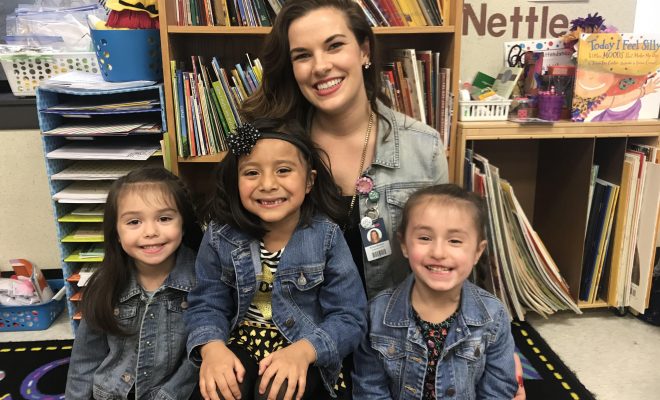Seeing the World Through a Different Lens

Defining Irlen Syndrome and why you haven’t heard of it before now
Max was diagnosed with dyslexia and ADHD in first grade. He was placed in special education classes with an IEP and a private reading tutor, but nothing seemed to help him focus and stay on task. By fifth grade, Max was only reading at a second-grade level and feeling discouraged and defeated by his disability.
After years of struggling, Max and his parents visited an Irlen diagnostician, and the real issue was identified. During the visit, the diagnostician eventually found a colored overlay making the words on the page clear and stable when placed over the text Max was attempting to read. Immediately, Max looked up and smiled from ear to ear as the words stopped moving and flashing, making it significantly easier for him to read. Max was able to benefit from his reading instruction, and within a few weeks his reading levels, retention ability, classroom behavior, and self-confidence improved.
Max’s story has been replicated in more than 240,000 children and adults diagnosed with Irlen Syndrome, a visual processing disorder often leading to academic difficulties, inattention, and physical symptoms. In other words, the brain cannot accurately process and understand visual information, resulting in an array of problems. Research shows an astounding 46% of people with reading problems or learning disabilities have Irlen Syndrome, either in isolation or in combination with other academic difficulties. Without the ability to accurately comprehend visual information, students often struggle.
Problems most often occur under conditions with bright or fluorescent lighting and with text that is small, crowded on a page, or printed with a high contrast between black print and white paper. Reading done on a computer, iPad, or other electronic device, with a demand for continued visual performance may increase symptoms. Due to distortions in visual perception, people with Irlen Syndrome often exhibit difficulties with performance, behavior, attention, restlessness when reading, and other academic activities which is why diagnosing at an early age is so important.
Discovered by Helen Irlen over 30 years ago, the former School Psychologist, Adult Learning Disability Specialist, and Child and Family Therapist has made it her mission to increase research and awareness of the disorder. The goal of her work is to ensure those affected by Irlen Syndrome aren’t limited by it; solutions are simple, cost-effective, and can be easily implemented by school districts.
The Surprisingly Common Symptoms
For nearly 12% of the general population, words, numbers, and even musical notes are like optical illusions, and physical symptoms like headaches or tiredness may occur after reading or attempting to read. It’s important for educators to recognize not all people see text the same, and what individuals with Irlen Syndrome see and feel is different from those without the disorder. Sadly, those with Irlen do not realize their experience is “not normal” and, even with extra assistance from teachers and tutors, may make little or no progress. Like Max, a majority of people with Irlen Syndrome are misdiagnosed with dyslexia or other reading disabilities and continue to struggle, often into adulthood. For many struggling readers, Irlen Syndrome is seen as the missing piece of the puzzle and the reason they’ve been struggling for so many years.
“My goal is to have at least one Irlen screener in every school or district in the world,” said Helen Irlen. “With more awareness and diagnosis early on, we could help suffering readers by relieving their symptoms and increasing their interest in and ability to learn to read with fluency and comprehension. Learning to identify these children is quick, easy, and can be done by adding a few questions to the intervention screening process. Best of all, the solution is cost effective.”
The Quick and Inexpensive Solution
Research shows that approximately 33% of individuals with learning disabilities can be helped using Irlen Filters, which are colored overlays or colored spectral filters worn as glasses. Upon use, print clarity, stability, and reading comfort instantly improve. Seeing the world through a colored lens helps Irlen sufferers process visual information without distortions, allowing them to read for longer periods of time and without physical symptoms.
Although many cases of Irlen Syndrome are hereditary, research shows that reading on electronic devices can intensify symptoms, making the trend to more computerized learning problematic for some students. Reading Horizons, a multisensory program used to rapidly increase reading skills, provides accommodations within their software that allows users to apply a colored filter to reduce contrast and glare.
“As a reading provider who works with educational programs for children and adults, it is important that we are paying attention to issues preventing reading success and spreading awareness of Irlen Syndrome to educators and parents,” said Laura Axtell, education specialist with Reading Horizons. “We provide optional colored overlays on our software programs in order to create the best possible learning opportunities for all students.”
Adjusting environmental settings for students is another easy and relatively inexpensive solution for students with Irlen Syndrome. For example, reducing the number of fluorescent bulbs or using floor lamps in classrooms, using recycled or colored paper instead of bright white, and using larger, easy-to-read fonts are just a few of the modifications that may help all students,Set featured image not just those with Irlen.
Every day, hundreds of thousands of children and adults unknowingly experience the symptoms of Irlen Syndrome and its impact on their ability to learn. Increasing awareness and screening in schools provides students like Max the opportunity to benefit from instruction and, thus, to thrive in classroom environments by seeing the world through a colored lens.
For more information on Irlen Syndrome or to take an online test to see if you or someone you know has Irlen Syndrome, please visit: http://irlen.com/
Don’t miss Helen L. Irlen’s free webinar on April 27. Click here for more details.
___
Helen L. Irlen is an internationally recognized educator, researcher, therapist, scholar, and expert in the area of visual-perceptual problems. A graduate of Cornell University, Irlen has been in education for 40 years as a school psychologist, a child and family therapist, educational therapist, founder and director of the Adult Learning Disabilities Program and Assistant Professor of Adult Learning Disabilities at California State University/Long Beach, instructor in psychology at Cornell University, and research assistant at Cornell. She is the author of Reading By The Colors which has been sited in textbooks on learning disabilities.





